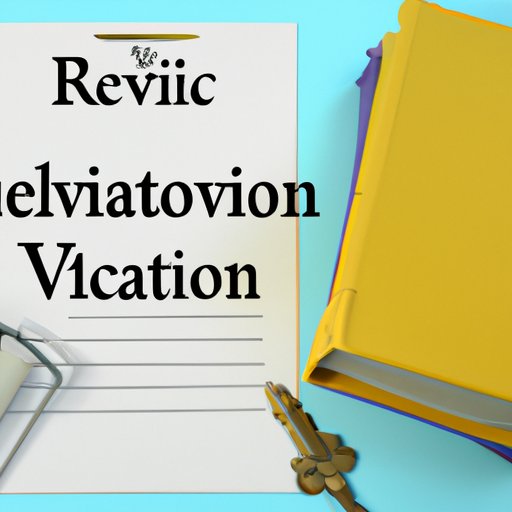Introduction
An eviction is a legal process used by landlords to remove tenants from a rental property. It begins with the landlord sending the tenant a notice to vacate, followed by filing an eviction lawsuit in court. If the court finds in favor of the landlord, they will issue an eviction judgment, which is a public record that stays on a tenant’s record for up to seven years.
The presence of an eviction on a tenant’s record can make it difficult for them to find housing in the future. Fortunately, there are steps tenants can take to get an eviction off their record.
Understand Your Rights and Responsibilities Under Landlord-Tenant Laws
Before taking any action to get an eviction off your record, it’s important to understand your rights and responsibilities as a tenant. Every state has its own landlord-tenant laws, so the first step is to research the laws in your area. These laws outline the rights and responsibilities of both landlords and tenants, and knowing them can help you protect yourself during the eviction process.
You should also learn about your rights and responsibilities as a tenant. This includes understanding the eviction process, such as when and how a landlord can file an eviction lawsuit. Knowing this information can help you prepare for the eviction process and potentially avoid an eviction.

Contact the Landlord to Negotiate a Settlement
If you’ve received an eviction notice or have already been evicted, one way to get the eviction off your record is to contact the landlord and negotiate a settlement. This involves making an offer of payment to the landlord in exchange for them dropping the eviction lawsuit or agreeing not to pursue the matter further.
When negotiating a settlement, it’s important to have an experienced professional on your side. A lawyer or housing counselor can help you understand your rights and responsibilities under landlord-tenant laws, as well as advise you on the best way to negotiate a settlement.
Seek Legal Advice
If you’re unable to negotiate a settlement with the landlord, it’s important to seek legal advice. A lawyer can help you understand your options and determine the best course of action. Depending on the circumstances, a lawyer may be able to help you challenge the eviction in court or even file a motion to vacate or set aside the eviction judgment.
File a Motion to Vacate or Set Aside the Eviction Judgment
If you believe the eviction was wrongful or that your rights were violated during the eviction process, you may be able to file a motion to vacate or set aside the eviction judgment. This is a legal document that asks the court to throw out the eviction judgment and remove it from your record.
To do this, you’ll need to get the necessary forms from the court and submit the request. You should also consult with a lawyer to ensure you have a strong case and understand the process.

Challenge the Eviction in Court
If you believe the eviction was wrongful, you may be able to challenge it in court. This involves preparing your case and representing yourself in court. You should consult with a lawyer to ensure you have a strong case and understand the process.

Pay for Record Expungement Services
Another option for getting an eviction off your record is to pay for record expungement services. These companies specialize in removing negative items from your record, including evictions. Research companies to understand the cost and evaluate if this is the right option for you.
Conclusion
Having an eviction on your record can make it difficult to find housing in the future. Fortunately, there are steps you can take to get an eviction off your record. These include researching local landlord-tenant laws, negotiating a settlement with the landlord, seeking legal advice, filing a motion to vacate or set aside the eviction judgment, challenging the eviction in court, and paying for record expungement services.
It’s important to understand your rights and responsibilities as a tenant and seek legal advice if necessary. Taking these steps can help you get an eviction off your record and improve your chances of finding housing in the future.
(Note: Is this article not meeting your expectations? Do you have knowledge or insights to share? Unlock new opportunities and expand your reach by joining our authors team. Click Registration to join us and share your expertise with our readers.)
